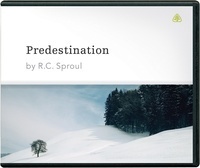R.C. Sproul's Blog, page 513
September 18, 2012
The Ark of the Covenant and God's Presence with Us

The ark of the covenant was the place of presence. While the Lord was present among His people in the exodus (Ex. 13:17–18, 21–22), He localized this presence in the tabernacle for the benefit of His sinful people. The tabernacle was constructed so that the Lord would be among His people: "And let them make me a sanctuary, that I may dwell in their midst" (Ex. 25:8). But in an even more specific way, the ark served as the place of the presence of God. As we read in Exodus 25:22,
"There I will meet with you . . . on the ark of the testimony, I will speak with you" (Ex. 25:22; emphasis added).
Here is such a mind-blowing idea about the God of the Bible that we have to pause for a moment. The eternal God who is not constrained by the existence of time, the infinite God who is not bound by the constraints of space, the transcendent God who dwells above and beyond all time and space, and the immense God who fills all time and space condescended to the weakness of His people and became manifest for their benefit in one locale. This God is not bound by time, but He bound Himself to the time-bound experience of His people. This God is not bound by space, but He bound Himself to this box. He is above all creational constraints, but He bound Himself to them. He is everywhere, but He was there.
The psalmist set this truth about the nature of Israel's God to song so that His people could celebrate Him:
The Lord is high above all nations,
and his glory is above the heavens!
Who is like the Lord our God,
who is seated on high,
who looks far down
on the heavens and the earth? (Ps. 113:4–6)
What a God we have. What a God has us. He chose to stoop very low and to humble Himself very far for the sake of His wandering people in the wilderness. Even more, He chose to stoop and to humble Himself for us in His Son, Jesus Christ, and then to stoop as low as death: "he humbled himself by becoming obedient to the point of death, even death on a cross" (Phil. 2:8).
The fact that the ark was the place of the Lord's presence among His people brought great assurance to the people of God. This high, lofty, majestic, and resplendent King dwelt among His grumbling, complaining, bickering, and sinful people (Ex. 15:24; 16:2, 8, 9, 12; 17:2). Does that sound familiar? We, too, are grumbling, complaining, bickering, and sinful people. Thankfully, God is not far off in another land, but He is near to us who are sinners. The promise to the new-covenant believer is that the Lord is near to us by the power of the Holy Spirit, who dwells in us (1 Cor. 6:19), even as Jesus promised His helpful presence (John 14:16). The assurance His nearness brings was described by the prophet Isaiah much later in this history of salvation. Just as God accompanied Israel when they wandered in a wilderness, so, too, He was with them in the days of their restoration from exile. Thus, the prophet said, "In all their affliction he was afflicted" (Isa. 63:9).
Adapted from God in Our Midst. Available now from ReformationTrust.com

Get 'Predestination' and 'Chosen By God' for a Gift of Any Amount
 Every day on our Renewing Your Mind broadcast we provide an opportunity for listeners to receive a biblically enriching resource for a gift of any amount and at the same time support the ongoing work of Ligonier Ministries. Occasionally, we highlight one of these offers on the blog.
Every day on our Renewing Your Mind broadcast we provide an opportunity for listeners to receive a biblically enriching resource for a gift of any amount and at the same time support the ongoing work of Ligonier Ministries. Occasionally, we highlight one of these offers on the blog.
Until Friday, you can get R.C. Sproul's teaching series Predestination on CD for a donation of any amount. As a bonus, you'll also receive the pocket size edition of Chosen By God.
Predestination CD
 In this series, Dr. R.C. Sproul discusses key Scriptural texts that deal with the doctrine of predestination and addresses common objections to it. He explores what the word means and how it differs from foreknowledge. He applies vital truth about God's sovereignty, grace, justice, and mercy to help us grasp the sweetness of God's choice in election.
In this series, Dr. R.C. Sproul discusses key Scriptural texts that deal with the doctrine of predestination and addresses common objections to it. He explores what the word means and how it differs from foreknowledge. He applies vital truth about God's sovereignty, grace, justice, and mercy to help us grasp the sweetness of God's choice in election.
Chosen By God Pocket Size
 Predestination is a debated topic. Yet the Bible is clear about the doctrine of election and its importance to our perspectives on God and man, and the nature of their contributions to salvation.
Predestination is a debated topic. Yet the Bible is clear about the doctrine of election and its importance to our perspectives on God and man, and the nature of their contributions to salvation.
Because of the widespread neglect of this doctrine, many people cite Chosen By God not only as their introduction to Dr. Sproul's teaching, but also as the resource that profoundly shifted their attention to an understanding of the predestining grace of God. Dr. Sproul shows how election is entirely compatible with human freedom, dignity, and responsibility. One of Ligonier's most significant and popular books, Chosen by God shows why all serious Christians cannot afford to ignore this important biblical doctrine, but instead should embrace God's initiative in Salvation.
Get get R.C. Sproul's teaching series Predestination on CD and the pocket size edition of Chosen By God for a donation of any amount.

Get Predestination and Chosen By God for a Gift of Any Amount
 Every day on our Renewing Your Mind broadcast we provide an opportunity for listeners to receive a biblically enriching resource for a gift of any amount and at the same time support the ongoing work of Ligonier Ministries. Occasionally, we highlight one of these offers on the blog.
Every day on our Renewing Your Mind broadcast we provide an opportunity for listeners to receive a biblically enriching resource for a gift of any amount and at the same time support the ongoing work of Ligonier Ministries. Occasionally, we highlight one of these offers on the blog.
Until Friday, you can get R.C. Sproul's teaching series Predestination on CD for a donation of any amount. As a bonus, you'll also receive the pocket size edition of Chosen By God.
Predestination CD
 In this series, Dr. R.C. Sproul discusses key Scriptural texts that deal with the doctrine of predestination and addresses common objections to it. He explores what the word means and how it differs from foreknowledge. He applies vital truth about God's sovereignty, grace, justice, and mercy to help us grasp the sweetness of God's choice in election.
In this series, Dr. R.C. Sproul discusses key Scriptural texts that deal with the doctrine of predestination and addresses common objections to it. He explores what the word means and how it differs from foreknowledge. He applies vital truth about God's sovereignty, grace, justice, and mercy to help us grasp the sweetness of God's choice in election.
Chosen By God Pocket Size
 Predestination is a debated topic. Yet the Bible is clear about the doctrine of election and its importance to our perspectives on God and man, and the nature of their contributions to salvation.
Predestination is a debated topic. Yet the Bible is clear about the doctrine of election and its importance to our perspectives on God and man, and the nature of their contributions to salvation.
Because of the widespread neglect of this doctrine, many people cite Chosen By God not only as their introduction to Dr. Sproul's teaching, but also as the resource that profoundly shifted their attention to an understanding of the predestining grace of God. Dr. Sproul shows how election is entirely compatible with human freedom, dignity, and responsibility. One of Ligonier's most significant and popular books, Chosen by God shows why all serious Christians cannot afford to ignore this important biblical doctrine, but instead should embrace God's initiative in Salvation.
Get get R.C. Sproul's teaching series Predestination on CD and the pocket size edition of Chosen By God for a donation of any amount.

R.C. Sproul on the Ubiquity of God's Glory in Creation
In this excerpt from his teaching series, Moses and the Burning Bush, Dr. R.C. Sproul discusses the ubiquity of God's glory in creation.
Transcript
In Isaiah chapter six, when he was having his vision of the occasion of his call to be a prophet, we recall the song of the angels in the presence of God in which they sang, "Holy, holy, holy is the LORD God of hosts." But what else did the song contain? "For the whole earth is full of His glory." So do you see the antithesis, do you see the collision between the radical secularism of people like Jean Paul Sartre and the teaching of the Scripture? The teaching of the Scriptures is not that the holy and the sacred are in some hidden realm, some esoteric sphere, where only the most brilliant, elite thinkers can penetrate to find a slight glimpse of the holy.
On the contrary, the whole earth is filled with the glory of God. So why then do we have this sense of the profane? Well Calvin answered that question this way, he said, "the whole of creation is a glorious theatre, screaming as it where, manifesting so clearly the holiness of God; but we are blind to it." But that blindness is a willful blindness. We are like human beings walking in this glorious theatre wearing blindfolds, blindfolds that we have put on our own eyes lest we see the holy and the sacred. Because, there is nothing more terrifying to sinful creatures than to be exposed to the holy.
And that's what we see here in this story. Moses sees the bush that is burning and is not consumed, and we are told in the narrative that he turns aside to look at it. And as he turns aside looking in the direction of that bush, he is not satisfied to observe it from a distance; he begins to walk towards the bush. He begins to approach it, and as he is approaching it suddenly the voice comes out of the bush, calling to him by name saying, "Moses, Moses, stop right there! Don't come any closer, don't draw near. Instead, take your shoes off, take the sandals from off your feet, because the ground whereon you are standing is holy ground."

September 17, 2012
Knowledge Without Zeal
Here's an excerpt from Knowledge Without Zeal, R.C. Sproul Jr.'s contribution to the September issue of Tabletalk.
When Paul, under the inspiration of the Holy Spirit, describes the church as the body of Christ, he speaks more wisely than we fools tend to hear. As is the habit of the modern evangelical church, we take the full, rich, and, indeed, beautiful instructions on how we are to live our lives together for the kingdom and reduce them down to something true but banal, safe, and reasonable. Paul tells us we are the body of Christ, and we hear, "Be nice to each other."
It is a slight improvement if this message reminds us that the body is filled with different people with different strengths, all of which are needful. That my ears can't see is not an objection they voice; that my ears hear does not make them better than my eyes. Paul makes this point, of course, because whatever parts of the body we may be, we all carry around oversized prides. Ears may have some level of gratitude for eyes, but they still think they are themselves the key components of the body. Brains may be smart enough to note that without a heart they would die, but they are quick to point out the heart's dependence on the brain. In short, every part of the body carries the temptation to rush to the front of the line, to hope to be the greatest in the kingdom of God.
Continue reading Knowledge Without Zeal.

September 16, 2012
Are We Too Concerned with Demons?

In recent years, there has been a renewal of interest in the work of Satan. Hollywood has given us a host of films to whet our appetite for the satanic. Within Christian circles, there has arisen a concern for ministries of deliverance. Some of these deliverance ministries have developed a bizarre and radically unbiblical view of demon possession and deliverance.
For example, we hear that particular demons cause particular sins. There is, they say, a demon of alcohol, a demon of depression, a demon of tobacco, and so on. Others say we can recognize the departure of a demon from a human soul by a manifest sign that is linked to the particular point of bondage. I have listened to recorded talks from well-known deliverance ministers (whose names I will not mention, to protect the guilty) in which they teach the signs of departure of the demon. A sigh, for example, indicates the departure of the demon of tobacco. Since the tobacco demon enters with the inhalation of smoke, he leaves with an audible exhale. Likewise, vomiting may be the sign of departure of the demon of alcohol. There are demons for every conceivable sin. Not only must each one of these demons be exorcized, but there are necessary procedures to keep them from returning on a daily basis.
I know of no polite way to respond to this kind of teaching. It is unmitigated nonsense. Nowhere in sacred Scripture is there to be found the slightest hint of this kind of demonic diagnosis. These teachings cross the line into the sphere of magic and result in serious harm to believers who are duped by them. Sadly, too much concern with Satan and demons means that we focus less of our attention on Christ. That must please Satan, and it is certainly not pleasing to God.
The Scriptures indicate that Satan can oppress us, assault us, tempt us, slander us, and accuse us. But a Christian who is indwelled by the Holy Spirit cannot be possessed by a demon. Where the Spirit of the Lord is, there is liberty (2 Cor. 3:17). If a person indwelled by the Holy Spirit can at the same time be sovereignly controlled by an evil spirit, then our redemption is meaningless.
All this emphasis on Satan and demons tends to distract us from another very real menace, our own sin. Yes, there is a Devil. There are real demons. But there is also the reality of sin. Satan may be our accomplice in our ongoing sin, but we cannot pass the blame and responsibility for our sin to a controlling demon. We do not have to be possessed by a demon to get drunk. There is enough abiding wickedness in us to do it all by ourselves. We can never say, "The Devil made me do it." We can say that we are tempted, incited, or seduced by Satan, but not that we are controlled or coerced by him.
There are two serious problems with the view that our sins are the result of controlling demons. The first is that we yield to the temptation to take no personal responsibility for our sin. How can we be responsible if in fact we are not able to resist? Second, we are lured into thinking that we are powerless without the aid of the deliverance minister. We are encouraged to think that we are not really guilty and that we are actually helpless without a minister with special powers of deliverance. This negates the entire biblical concept of sanctification. It is surely unbiblical to teach that we cannot lead lives pleasing to God unless some so-called expert on deliverance comes to our side. Therefore, I say with all urgency that believers must turn away from those who teach such things. Indeed, we should run for our spiritual lives.
Excerpt from R.C. Sproul's Pleasing God. Available now from the Ligonier Store.
Copyright 2012 R.C. Sproul. Pleasing God published by David C Cook. Publisher permission required to reproduce. All rights reserved.

Twitter Highlights (9/16/12)
Here are highlights from our various Twitter accounts over the past week.
For Calvin, the Psalter in particular teaches the vital lesson that the Christian will suffer for his Lord in this life. —Robert Godfrey
— Reformation Trust (@RefTrust) September 10, 2012
Every doctrine is dangerous, and can be - and has been - abused (D. M. Lloyd-Jones).
— Ligonier Academy (@LigonierAcademy) September 11, 2012
God was in the precise place on 9/11 that He was on the day before and the day after. He was on His throne... —R.C. Sproul
— Ligonier Ministries (@Ligonier) September 11, 2012
Please consider helping us reach the world through digital media: ligm.in/QDeJwg
— Ligonier Ministries (@Ligonier) September 12, 2012
There is no delusion like the folly of believing that a course of sin will conduce to our happiness (William Plummer).
— Tabletalk Magazine (@Tabletalk) September 13, 2012
Grace, by definition, is something that God is not required to grant. He owes a fallen world no mercy. —R.C. Sproul ligm.in/SIgBHI
— Ligonier Ministries (@Ligonier) September 14, 2012
Saving faith and real converting grace will always produce some conformity to the image of Jesus (J.C. Ryle).
— Ligonier Academy (@LigonierAcademy) September 14, 2012
You can also find our various ministries on Facebook:
Ligonier Ministries | Ligonier Academy | Ligonier Connect | RefNet
Reformation Bible College | Reformation Trust | Tabletalk Magazine

September 14, 2012
What Concerns You About Modern-Day Protestant Christianity?
I try not to focus my gaze too much or too long on the discouraging things I see simply because I think I need to be careful not to become jaundiced, and cynical. As a Scottish person I already have enough native tendency to be melancholic! Yet it is true that there are many things to cause concern. The passage which was expounded at my ordination to the Gospel ministry was 2 Corinthians 4:1-6, and it has served as a kind of guiding light to me ever since. Paul says that he has put aside not only disgraceful, underhanded ways, but also that he does not "do" things just because "they work." Instead he expounds the truth and does so in such a way that the truth of the gospel and his own integrity are clear. By contrast we have become a very pragmatic church; we have a thirst for size (bigger is seen as better.)
We have also spawned a cult of the personality and the guru. I have seen pulpit search committee material stating in black and white that they need an "outstanding communicator" to be their minister. Much of our thinking has actually become very worldly.
One indication of this recently is in the ease with which Christians now speak about "the quality of our worship." But unlike their forefathers, they worship only once on Sunday. Many ministers know that an evening service would not be well attended for all kinds of reasons that I suspect will not hold up before the God of the universe who is worthy to be worshiped and adored, world without end! I wonder what He thinks of the quality of our worship.
It is also a concern to me that we are living in the age of the worship leader and the counselor rather than the preacher (what we do and what we talk about — sadly usually ourselves — takes precedence over God talking to us.)
Again there is the lack of prayer and of the Church praying. This is to me the most alarming, for this reason: we have built apparently strong, large, successful, active churches. But many of our churches never meet as a congregation for prayer. I mean never! What does that indicate we are saying about the life of the Church as a fellowship? By contrast, the mark of a truly apostolic spirit in the church is that that we give ourselves to prayer and the Word together (Acts 6:4). No wonder "the Word of God continued to increase and the number of the disciples multiplied" (Acts 6:7). If this is so, it should not surprise us that while many churches see growth, it is often simply reconfiguration of numbers, not of conversion. I greatly wish that our churches would learn to keep the main things central, that we would learn to be true Churches, vibrant fellowships of prayer, Gospel ministry and teaching, genuine mutual love. At the end of the day, such a Church simply needs to "be" for visitors who come to sense that this is a new order of reality altogether and are drawn to Christ.
Read more of this interview conducted in 2008 with Ligonier teaching fellow, Dr. Sinclair Ferguson.

September 13, 2012
Is Election Unfair?

The teaching that God chooses some people out of the mass of fallen humanity to be saved and not others raises the objection that God is not fair. Somehow it is widely assumed that God owes all people either the gift of salvation or at least a chance of salvation. Since they cannot be saved apart from His grace, He owes it to everyone to grant them that grace.
This kind of thinking results from a fundamental confusion between God's justice and His mercy or grace. Grace, by definition, is something that God is not required to grant. He owes a fallen world no mercy. If we cried out for justice at His hands, we could all receive the just condemnation we deserve. Justice is what we deserve. Grace is always and ever undeserved. If we deserved it, it would not be grace.
Justice is what we deserve. Grace is always and ever undeserved. If we deserved it, it would not be grace. —R.C. Sproul
The issue is complicated when we consider that God chooses to grant this saving grace to some but not to all. We recall that, in the first place, He owes it to no one. Once someone has sinned, God owes that person nothing. Indeed, even before sin, God owes the creature nothing. It is the creature who is indebted to God (for sustaining if not also saving grace), not God to the creature. But what is often assumed is that if God grants grace to some, then He must grant the same measure of grace to all if He is fair and just. Here we must stop for a moment and ask why this should be so. Why does the granting of grace to some require the granting of grace to all? Again we recall that in this process no one receives injustice at the hand of God. The elect get the grace they do not deserve, while the reprobate get the justice they do deserve. If God decides to pardon one guilty person, that does not mean that those He does not pardon somehow become any less guilty.
In answer to his own question, "Is there unrighteousness with God?" Paul emphatically declared, "Certainly not!" For the Apostle, it was unthinkable that there should be any unrighteousness with God. He reminded his readers of what God revealed in the Old Testament when He said to Moses, "I will be gracious to whom I will be gracious, and I will have compassion on whom I will have compassion" (Exod. 33:19).
We see in this reminder the unmistakable concept of God's sovereign grace. Paul made it unambiguously clear that God always reserves the right to exercise His mercy and grace according to His own good pleasure. This is the supreme right of executive clemency. It is this sovereign expression of love that redounds to the praise of His glory. It is this love that leaves us astonished and singing doxologies. It is this overwhelming love that provoked Paul to cry out: "Oh, the depth of the riches both of the wisdom and knowledge of God! How unsearchable are His judgments and His ways past finding out! 'For who has known the mind of the LORD? Or who has become His counselor?' 'Or who has first given to Him and it shall be repaid to him?'" (Rom. 11:33–35).
The conclusion Paul drew from this sovereign expression of grace and mercy is this: "So then it is not of him who wills, nor of him who runs, but of God who shows mercy" (9:16).
Excerpt from God's Love by R.C. Sproul. Available now from the Ligonier Store.

$5 Friday: Islam, Free Will, & Faith

It's time for our weekly $5 Friday sale. This week's resources cover such topics as Islam, faith, the Lord's Supper, suffering, music, free will, and more. We also thank Cruciform Press for their partnership this week.
Sale runs through 12:01 a.m. — 11:59 p.m. Friday EST.
View today's $5 Friday sale items.

R.C. Sproul's Blog
- R.C. Sproul's profile
- 1931 followers



